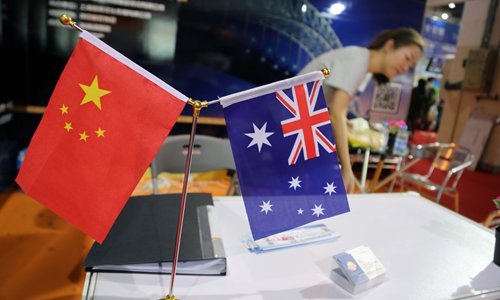Held hostage by media hype: truth behind diplomatic phone call between Chinese embassy and DFAT
By Bai Yunyi Source:Global Times Published: 2020/4/30 9:08:21

Chinese and Australian flags displayed at an investment fair in Shanghai Photo: IC
Friction and disputes have become more and more frequent between China and Australia in recent years. The latest one, however, was caused by a phone call.
On Tuesday, the Chinese Embassy in Australia published a report "spokesperson responds to Q&A" about a phone call between Ambassador Cheng Jingye and the Department of Foreign Affairs and Trade (DFAT) Secretary Frances Adamson on Monday.
This triggered inexplicable "shock" for some Australian media such as the Australian Broadcasting Corporation (ABC). They made a mountain out of a molehill, and some of them attacked the Chinese embassy for "clear and intended breach of diplomatic protocol," and "leaking details of a private conversation between Australian officials."
The Chinese embassy then made a further clarification on Wednesday saying that the embassy's previous statement was a legitimate response to the earlier breach of diplomatic protocol by the Australian side.
"The report on the phone call between the Chinese Ambassador and DFAT Secretary first appeared in Australian media. The phone call itself, as well as the content of the conversation, was obviously leaked by some Australian officials. As the Australian media report was inaccurate and misleading, the Embassy had no choice but to set the record straight," said the embassy.
Was the statement by the Chinese Embassy really a "breach of diplomatic protocol?" What has really poked the Australian side? The Global Times investigated to get the matter sorted.
The spat began when Australia called for an international independent inquiry of China over the COVID-19 pandemic. According to an interview transcript released by the Chinese Embassy, when Ambassador Cheng was asked by The Australian Financial Review on Sunday about the consequences of Australia continuing to pursue this inquiry, Cheng said this kind of action by Australia could worsen the Chinese public's frustration with the country.
People would wonder why they should still go to study or shop in a country that is not so friendly to China, Cheng said. But the ambassador also said that he does not want that to happen, and this was not helpful for either side.
However, this statement was soon reported by Australian media as "an economic threat and boycott of Australia."
Under the context of much-hyped Australian public opinion, Cheng and Frances Adamson held a phone call on Monday. The call eventually led to reports that "China leaked phone call details."
However, the Global Times reporter found that it was not the Chinese embassy that first disclosed the information about the phone call, but the ABC.
Early Tuesday morning, the ABC interviewed Australian Minister for Trade, Tourism and Investment Simon Birmingham and asked, did the Australian government request the ambassador to explain his previous "economic coercion" comment? Was the ambassador summoned to parliament for questioning, or was he on the phone?
As a result, Birmingham said there was a phone call between Cheng and Adamson, and added that the Australian government had made it abundantly clear in the call that it would not change its position on pushing for an investigation into China because of "economic coercion."
But is this really what the Australian minister and media said? After the ABC's program, the Chinese embassy issued a "spokesperson responds to Q&A" on the same day, making clear that the report was misleading.
Global Times noticed that the biggest difference between the Chinese side and the Australian side on this issue is that China mentioned that Secretary Frances Adamson admitted in the phone call that, "it is currently not the time to launch an investigation, and the Australian side has no specific plan. We do not want this spat to affect the two countries' relations."
This is a far cry from the message the Australian government has been trying to send to the public, and probably the real reason that made Australian media and politicians angry.
What is interesting is Australia's reaction: No Australian politician or media can refute the information released by the Chinese embassy with facts, and they started to attack China for "unprofessional" and "leaking diplomatic details."
DFAT of Australia expressed pity about the "violation" but they did not question the ambassador's words.
The ABC described DFAT's response as "restrained but a bit harsh."
Li Haidong, a professor at the Institute of International Relations of the China Foreign Affairs University, told the Global Times on Wednesday that China's action does not violate diplomatic practice.
First, the call was not about major national secrets, it was just a topic of widespread public concern, so there is no "leak."
Second, it is common for the two sides to release content and statements about meetings or phone calls between political officials. What really violates "diplomatic professionalism" is the publication of distorted and untrue information. As Australia and other countries have been keen to stress recently, the COVID-19 pandemic is a topic of international concern that requires transparency.
The Chinese embassy's timely and open dialogue with Australian officials reflects the principle of transparency, which is very helpful to the public who are truly concerned about the pandemic and China-Australia relations, said Li.
The expert believes that amid the ongoing smearing by Australian media, the Australian government has been held hostage by the media for years, avoiding public discussion of co-operation between the two countries.
On the other hand, they have to take China seriously in the interests of their country. The embassy's statement just pointed it out and let more Australian people know that their government attaches importance to China-Australia cooperation, which is not necessarily a bad thing for the Australian government.
"At least in the minds of some Australians who support cooperation with China, the government can change its image of treating the relationship like a 'broken pot'," Li said.
Posted in: DIPLOMACY